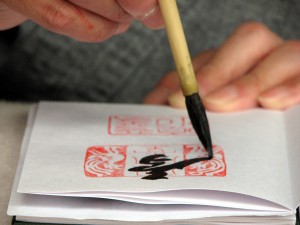Week 4’s reading by David Bolter looked at the history, technologies and theories behind the written word. Although I found the reading mainly ‘pro-technology’, there were also a few examples of where hand-writing was portrayed in a very positive light. Bolter compares hand-writing to print writing, discussing how even though print enhanced legibility, the ‘organic’ and personal nature of writing is lost in typography. When something is typed rather than written, it ultimately loses a part of the writers identity. Hand-writing is like a signature – it is obvious that the writer is the one who has written a certain page; but the ‘mechanically correct’ markings of a printed document mean that it could be written by anyone. A second mention of hand-writing as advantageous in comparison to print, is the quote by Roman rhetorician Quintilian, who remarks that ‘when we write…our hand cannot keep up with our thoughts, and so we have time with our words’. This concept has changed with new ‘faster’ typing technologies that can essentially keep up with our brains.
In saying this, there are still similarities between different forms of writing. The writer always needs a ‘surface’ to put marks on and a tool with which they make them (besides, as also mentioned in this reading, writing is not a natural, humanly thing). These materials help to define the nature of writing. Writing with a pen and paper, is different to using a type-writer, which in turn is different to writing on a computer. Each technology requires different skills, but all of them demand ‘the intention of the writer to arrange ideas systematically in a space for later examination by a reader’. All of this may seem completely straight-forward and obvious, but it is interesting to realise that although technology is progressing rapidly, the very foundations of language as a written form essentially stay the same.
Bolter also notes that literate men and women ‘reveal their literacy when they are speaking as well as writing’. This is quite a fascinating concept as I perceive my style of writing to be distinctly different to my style of speaking. Like most people, my conversational language uses ‘filler’ words such as ‘um’ and ‘yeah’ far too often (not to mention the word ‘like’); plus I swear, a lot. But this made me wonder if I would talk differently if I was illiterate…and yes, I think we all would. As Bolter suggests, literate people have wider vocabularies (as there are more places we can pick up new words) and we structure our oral use of language similarly to our written use of language. Most of the time we speak in full sentences or paragraphs. In essence, we are writing all the time, even if it is just in our minds. (I know at least my mum and I often imagine how a word looks like in our head when we are thinking about something i.e. if someone said butter, we would not visualise a block of butter, but instead the word ‘butter’). So in a sense the ‘materiality’ of words has altered how we speak.
One final idea that I found intriguing was a brief comment that was made about Chinese and Japanese standards of hand-writing – they would perceive Westerners as barely literate, because of our appalling calligraphy skills. I remember when I was learning Japanese in primary school, that our teachers (who were native to Japan) always had the most immaculate handwriting using the English alphabet. We would watch documentaries about Japanese students learning how to write in English lessons and they would have ‘calligraphy‘ workshops, in order to learn how to ‘draw’ our alphabet. That’s hardly something children learn how to do here even though English is their first language! In some ways I think the Chinese and Japanese would be correct in saying that the legibility of writing has a lot to do with literacy. For instance, when people try to read my hand-writing they appear to wonder if I speak a whole different language with a completely different alphabet.
